Color Me Bad
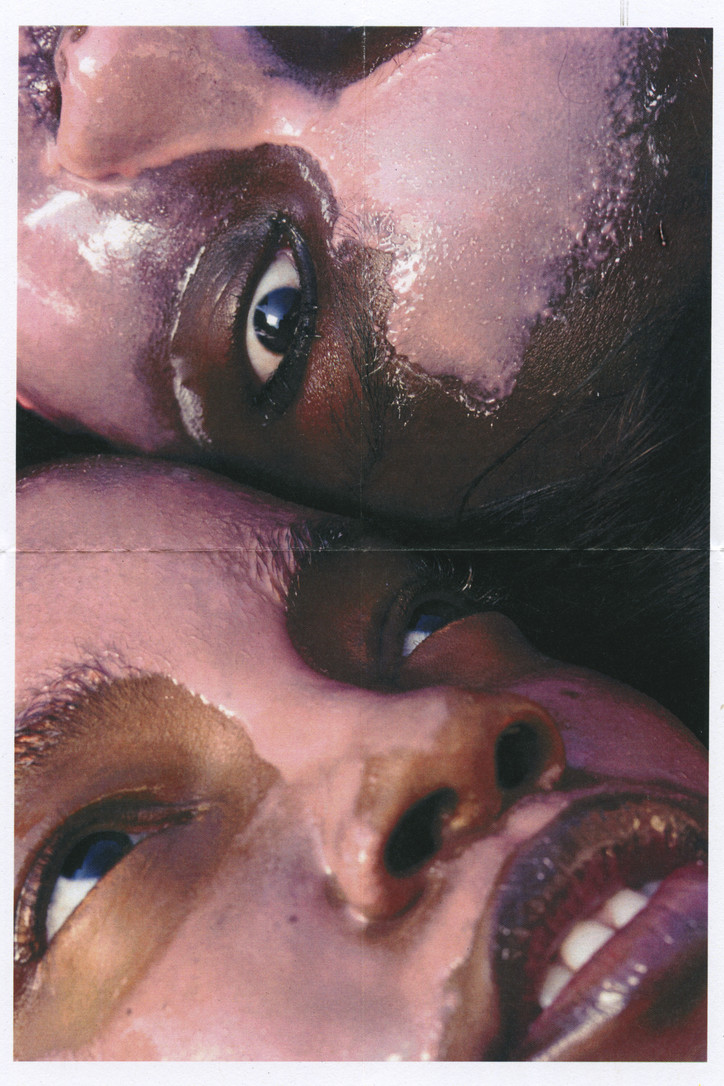
Follow @officebeautynyc for more interviews with our favorite makeup artists, Instagram beauty gurus, club kids and inside info from our office Beauty Committee.
Stay informed on our latest news!

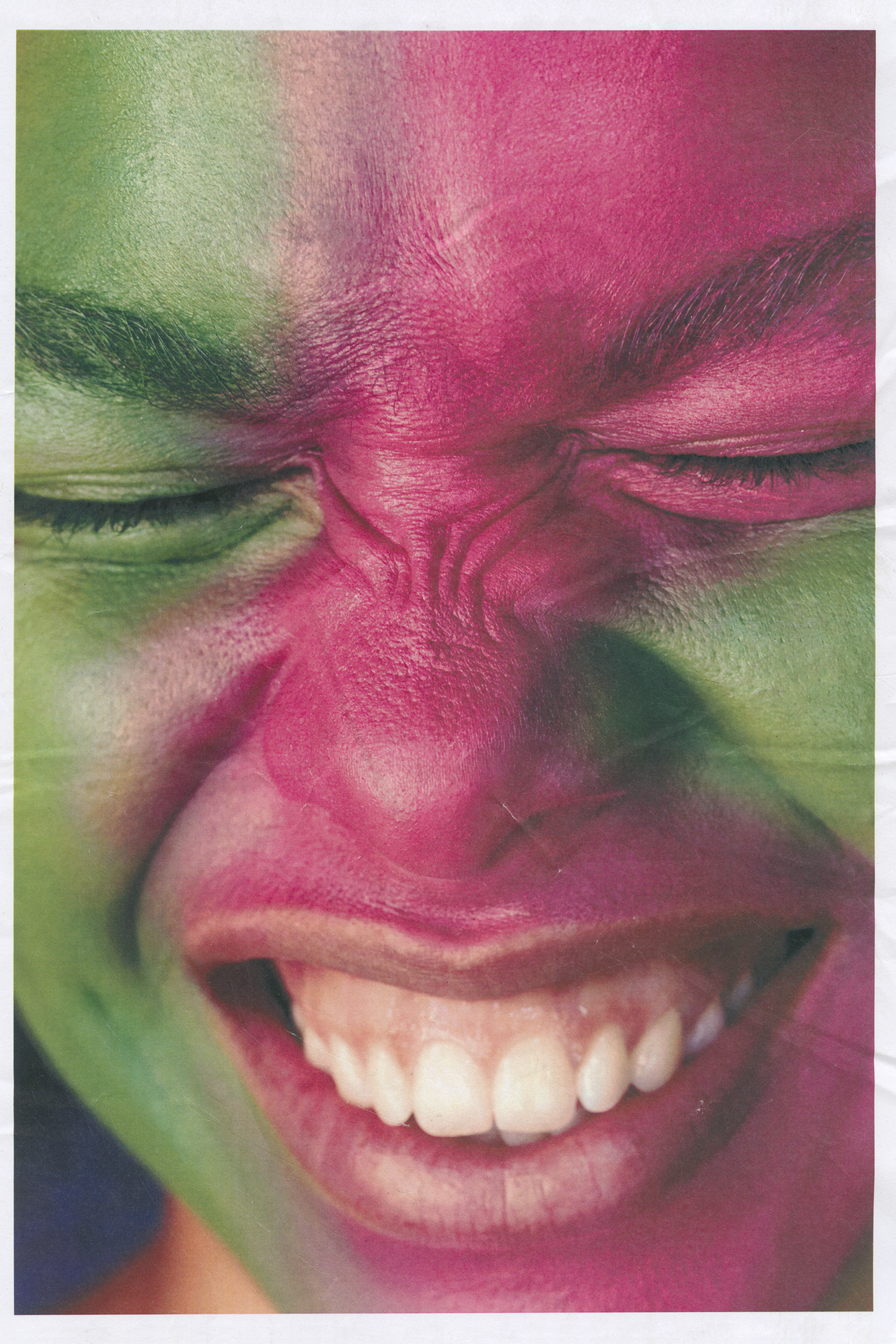

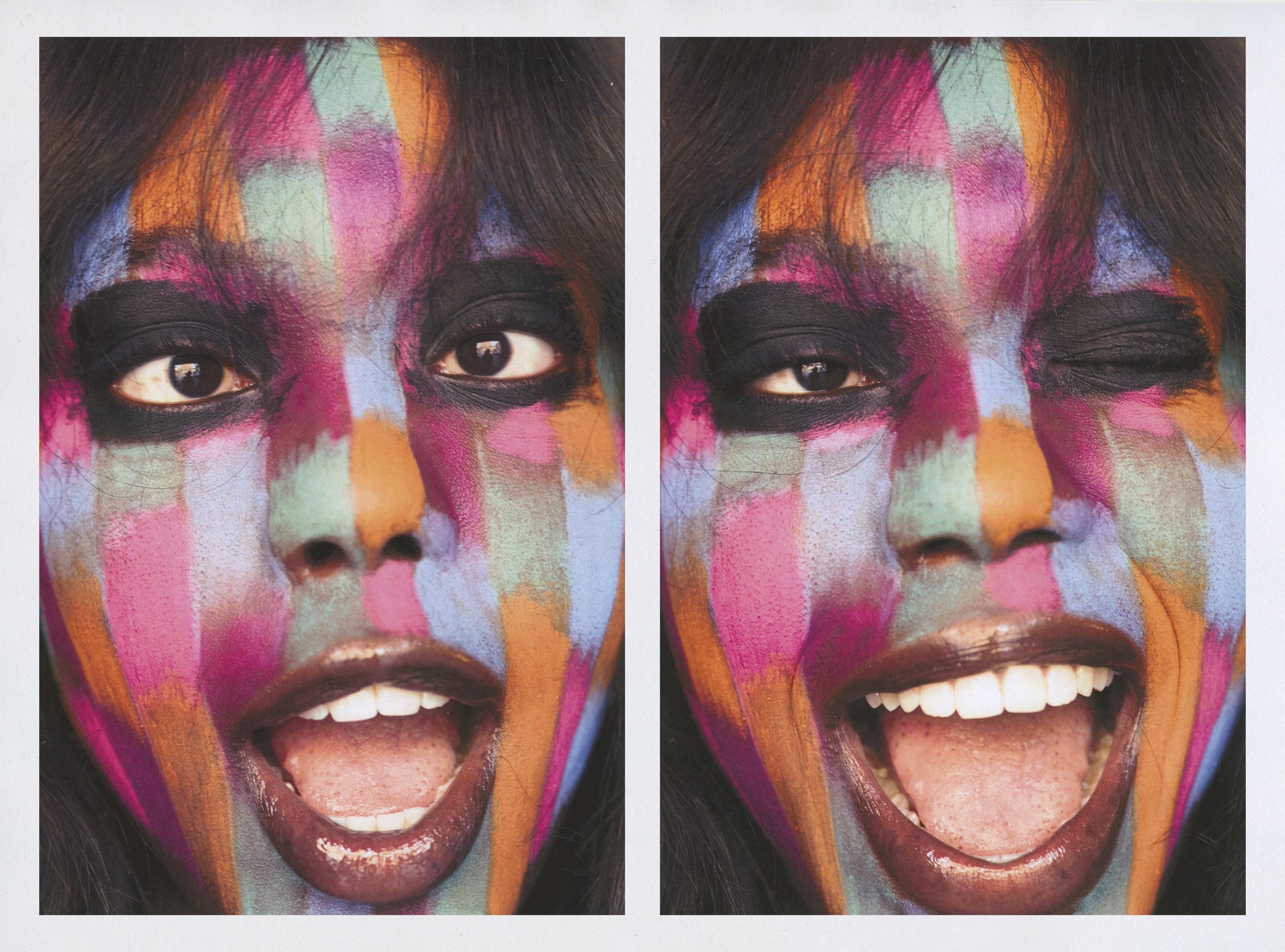
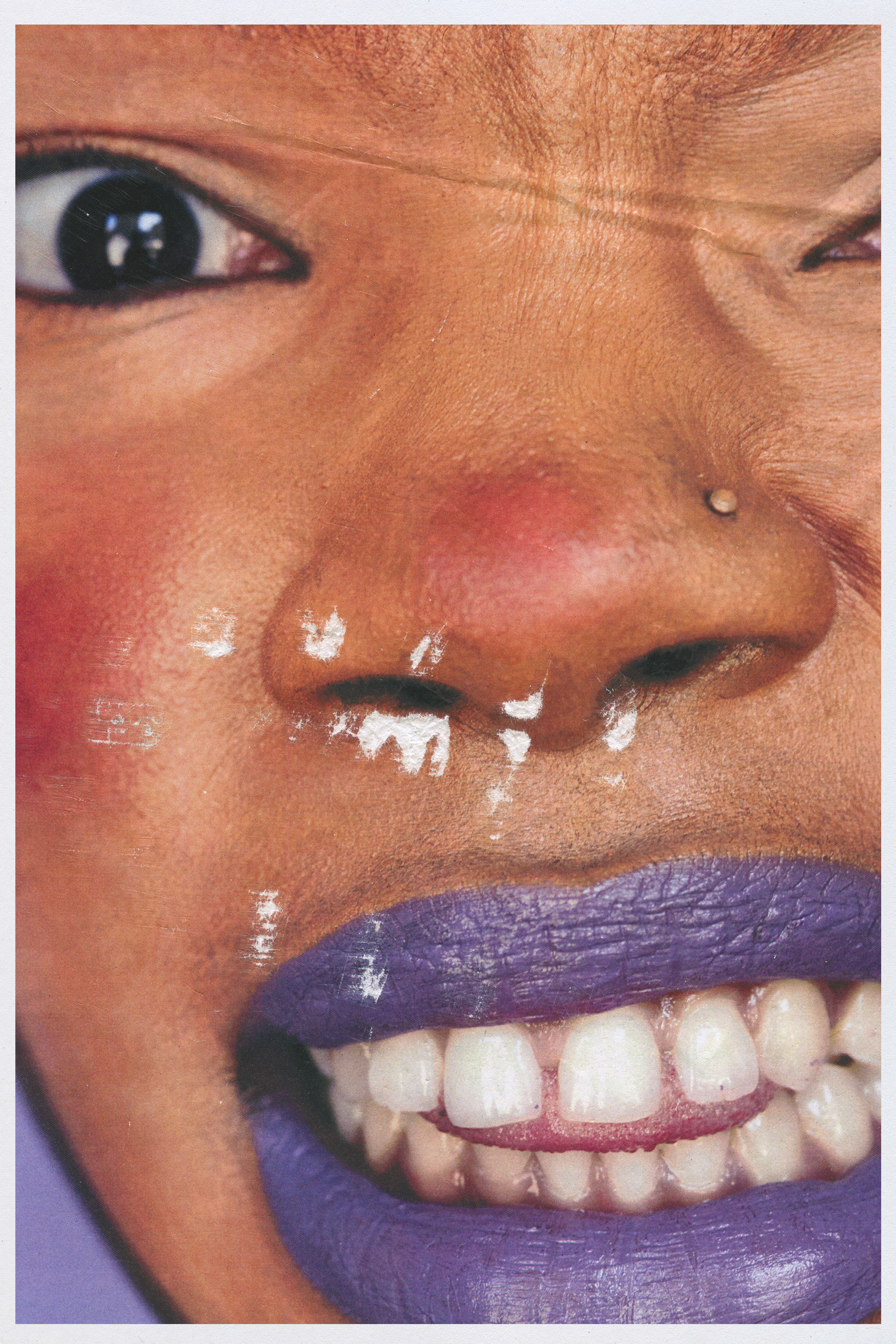

Follow @officebeautynyc for more interviews with our favorite makeup artists, Instagram beauty gurus, club kids and inside info from our office Beauty Committee.
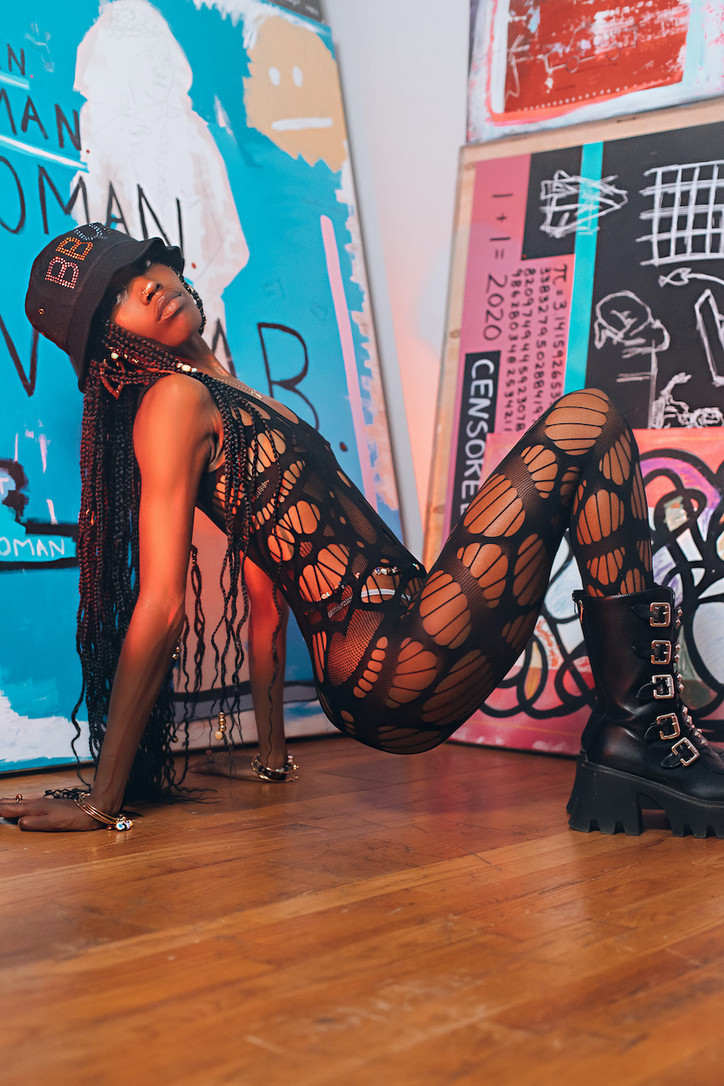
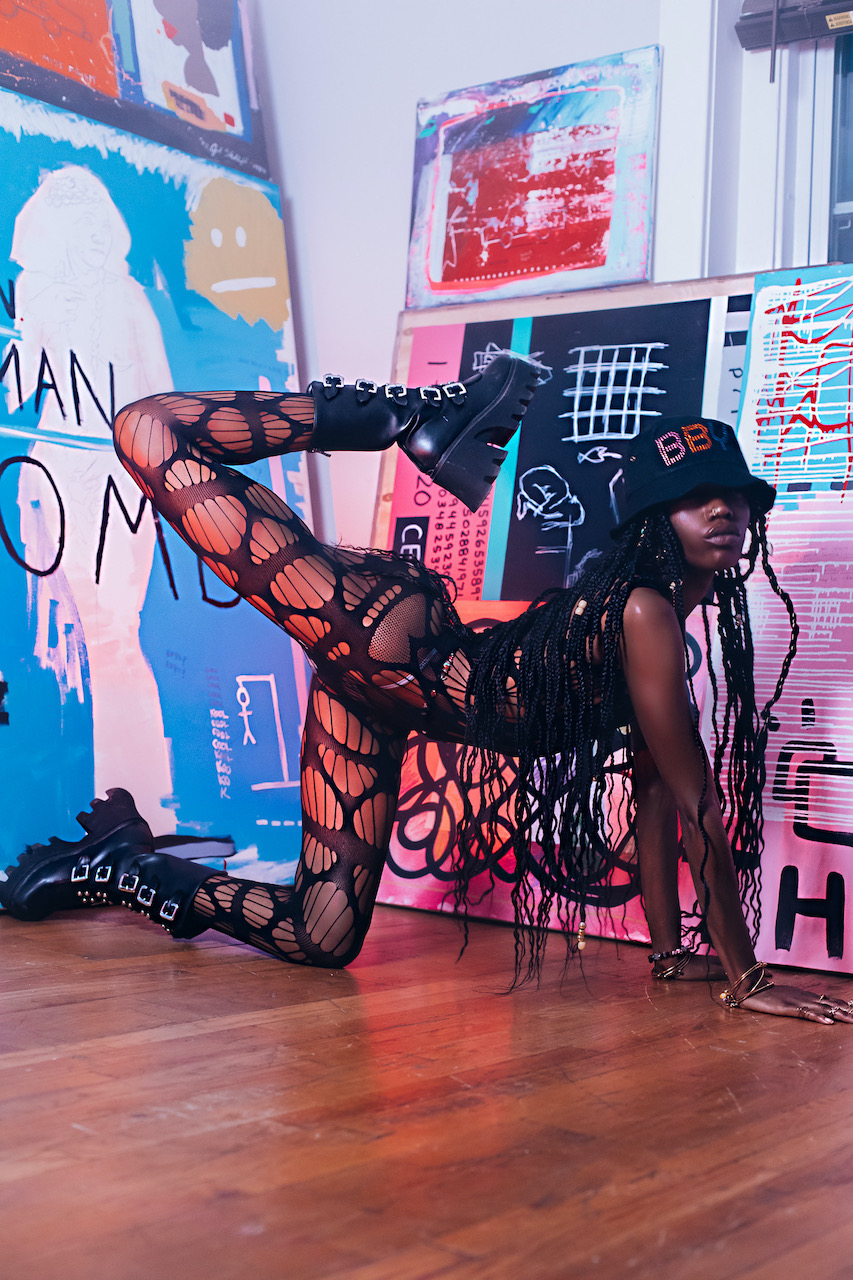
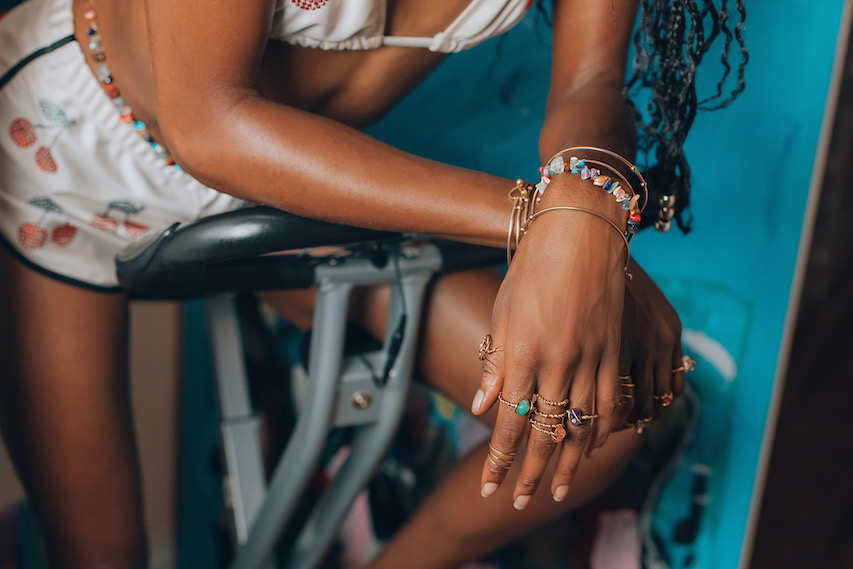
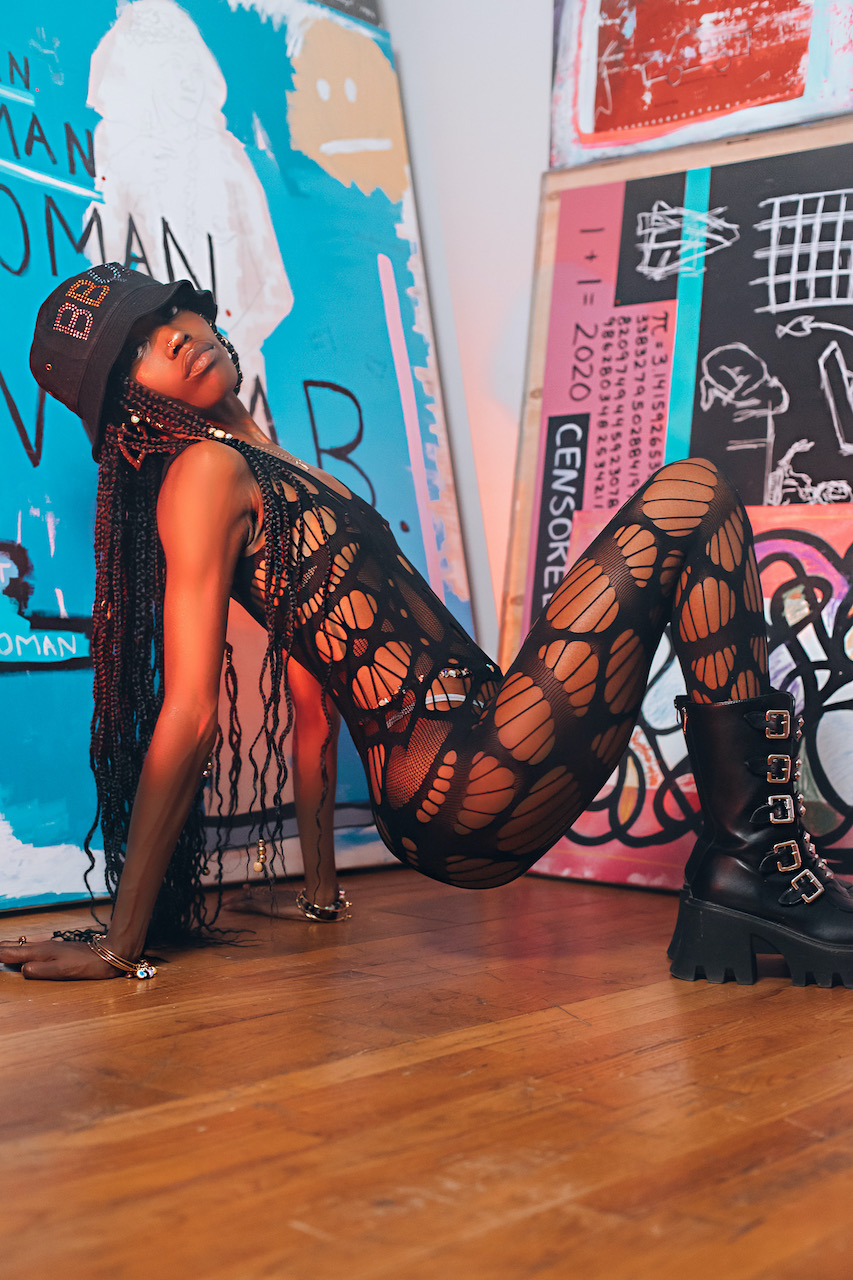
How did you start BBYG?
I feel like it’s been in the workings my whole life. I’ve been creating since I can’t even remember. That’s my form of expression taking shape through clothes, music, art, just anything. In 2020, right when the pandemic hit, I was just in a space of feeling like I needed to be more in control of my reality. So BBYG started as a safe space for me to share what I felt was important to share, and to build a platform for others to feel comfortable to share and create and build-- build your own dream world. So that's really that's how it started, with the idea of having a safe space to create as a black woman that I have control over. Nobody's telling me ‘you have to make these products, these rings.’ It’s just what I naturally feel that I should be producing. And then making the space for other people to hold what they produce. Because that's all so important.
What does Black beauty mean to you?
The phrase that comes to mind is just always being unapologetically yourself. I feel like that is almost taboo now. In the age of social media, and just wanting to fit in and be like everybody and do what's trendy, beauty is being able to be unapologetically yourself.
It really starts with loving ourselves and making the space to appreciate all of our beauty in all of its forms. We have so many. We have a huge array of skin tones, dialects, backgrounds. There’s so much to appreciate and love.
You started out modeling. How have you had to navigate that space differently?
I'm not gonna say like, I'm the only dark skinned model. But I'm definitely, like, one of five. But you know, that diversity, and just seeing that we have beauty outside of just what the standard is, is important. But there are so many opportunities for other people to just live and be and they get thrown opportunities. But we have to, we kind of have to be a full package to get the same.
When everything with the George Floyd protests was happening a bunch of brands were reaching out and wanting to work with me, and I would do my research. I'm going through your Instagram, I've been going through your website, I've looked through everything to see just how inclusive you really are. I don't want to say that it has slowed down my work, because I've only turned down a few jobs, but I feel like I needed this break to understand my worth as a black model in this industry.
You’ve started hosting events and interviews through BBYG. What is your vision for the platform?
So for the events I work with this not for profit in Buffalo, called the community garden party. We basically grow herbs and vegetables and fruits in the garden to give people on the East side better access to nutritional foods, because on the East side of Buffalo it’s real ratchet, real ghetto. It’s a lot of liquor stores, there's a lot of fast food, our people are not even in the right mindset to even elevate themselves. And I know how hard it is, because I was that kid looking outside the car at all the lights and the concrete lots dreaming that all that pain could be something, and now through our not for profit, we are creating food for people in the community with healthy alternatives, vegan options. We’re introducing newness, introducing clarity. So we've been doing cleanups, and we even gave away at least 200 meals already, and the summer just started.
With the interviews, I have been thinking about doing interviews with people in the community just because in the media, I feel like there's this caricature of how Black people are. And outside of music and sports, we have a voice and we have real issues and things to work out within our communities. So with the interview series, I really just wanted to highlight how similar we think and how connected we are. Because the world really tries to tear us apart. They don't want us to have Black unity, they don't want us to understand our power. But that's so necessary for a person. It's so necessary for those kids and people who feel like outsiders and black sheep to know that you're not the only one because that mindset is so limiting and lonely and damaging.
Who is someone that inspired you, or helped you feel less lonely?
I’ve been studying a lot of herbs and roots, and I’ve been learning about this herb the past six months, it’s called High John the Conqueror. His story is that during slavery, he was an African Prince. When they were stolen from Africa and brought here, he always had his energy maintained, because he knew that he was royalty. During slavery, through all the bullshit, he would travel through his mind and his spirit, and controled his reality that way. Like, I don't have to sit and endure this pain, I can travel in my mind and go where my soul is yearning to be, where I'm meant to be, instead of inside of this hurt. I relate to that so much because I grew up-- I didn't know if I was gonna say this, but when I grew up I was abused. And that’s a part of my authenticity. I was mentally, physically, like, it’s very intense. I was very abused until age 18 and I moved away instantly to New York, then LA and I’m just now coming back home, and that’s why everything feels so intense for me.
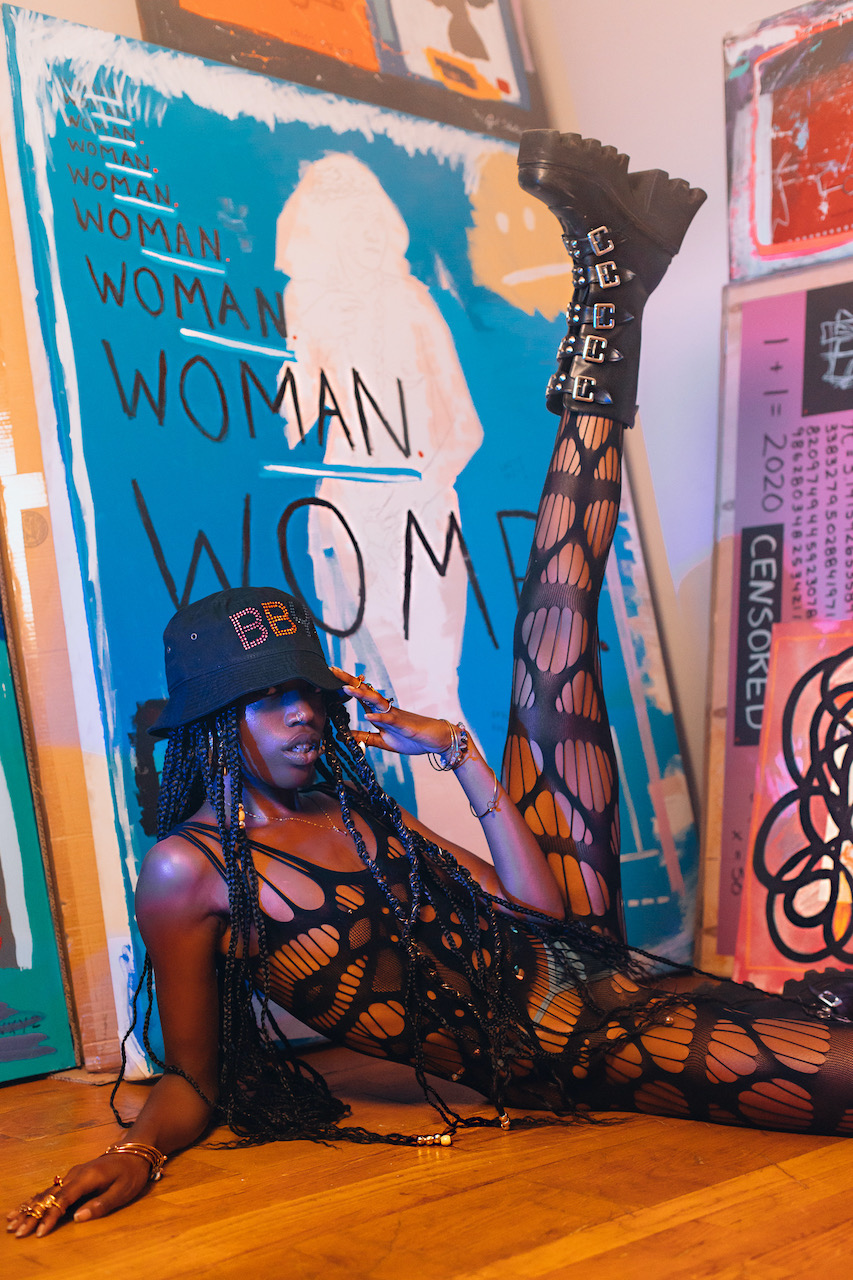
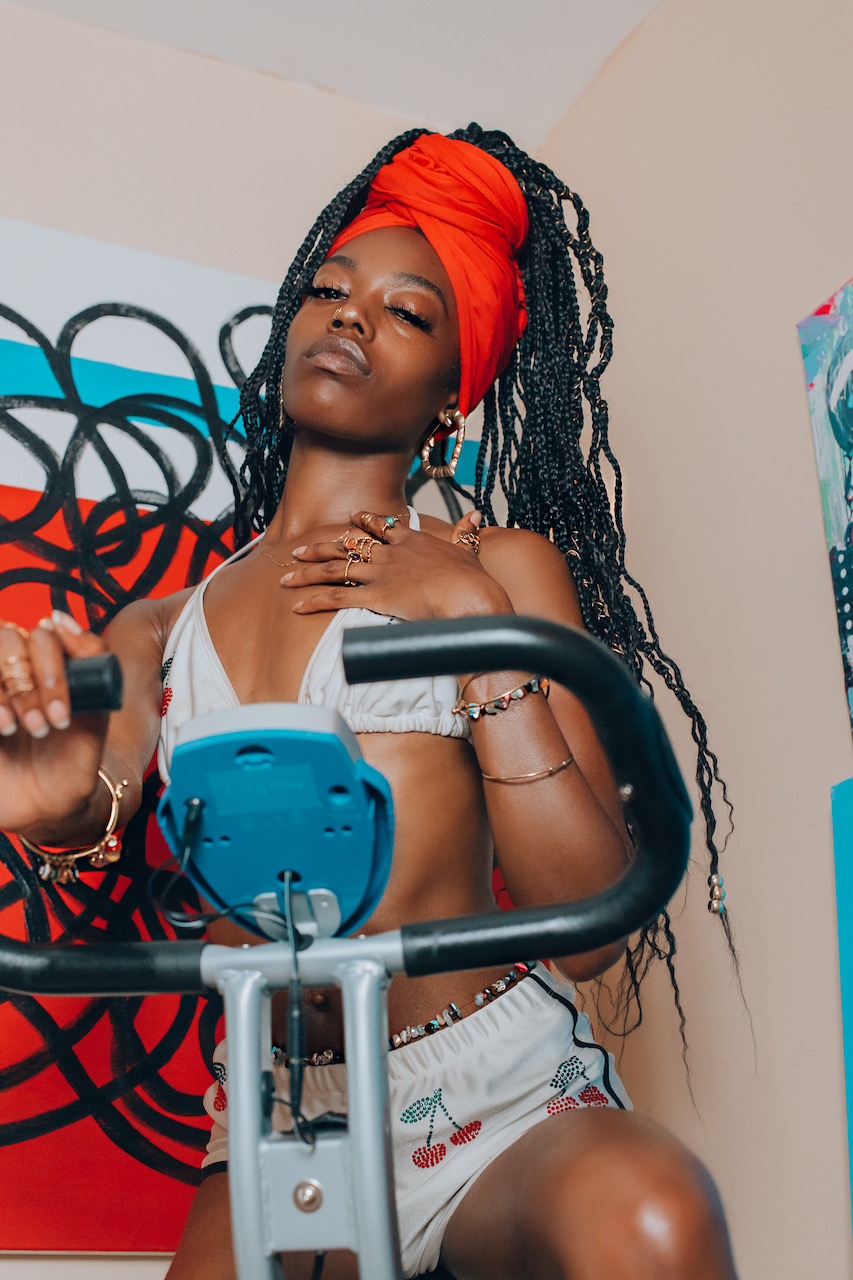
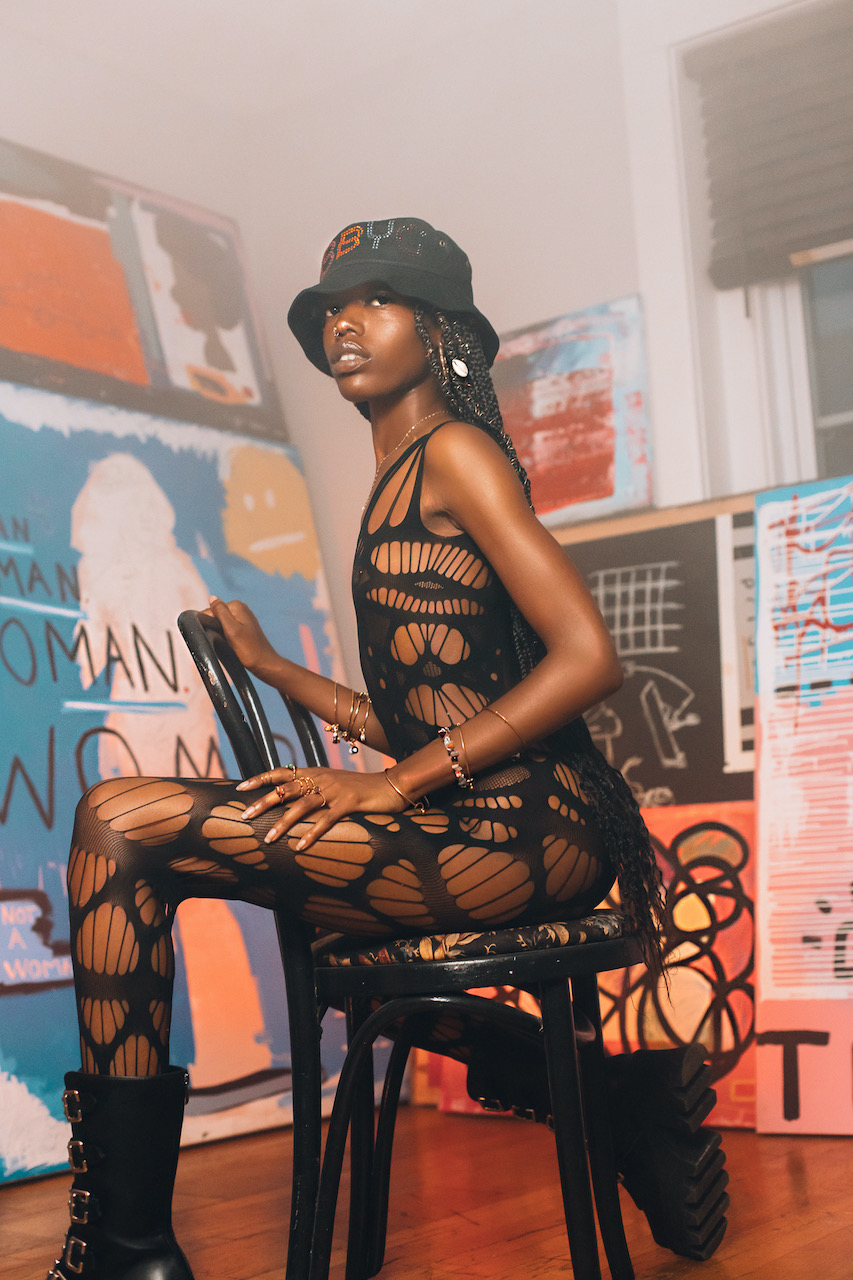
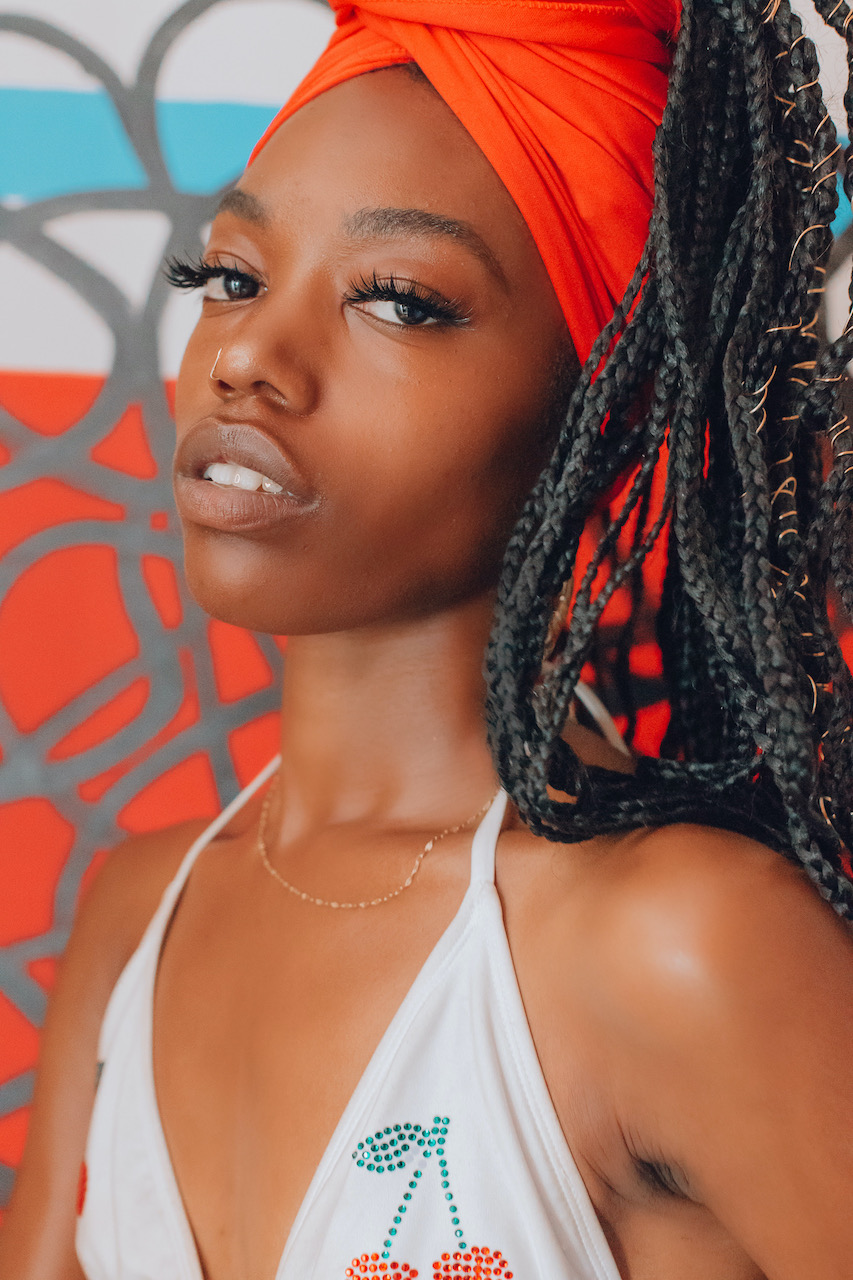
How does it feel to be back home?
I had to dream a lot here. I had to really free myself a lot here. But to come back and be living my dreams, it's just another phase of healing for me, because last time I was here. I was just like High John the Conqueror. I was traveling in my mind, creating my future. So I had to come back and give back, because I’m not the only black girl who had hella traumatizing events and still made something. I’ve created a stage for myself and now it’s time to invite others to the stage to help me, so we can help each other. Because, man, community is everything. I feel like if you don't have your city behind you-- you need your people on the same wavelength as you. I don't know, Buffalo just has a certain energy.
What role did your spiritual journey play in the creation of BBYG?
My spiritual journey started like, I'd say, like 2018. Right after I had gotten into modeling and my self esteem was kind of wobbly, because I was doing castings, and was moving a lot. I felt like I needed to slow down, and really assess what I want out of this world. I was so interested in getting to the deepness of who I am as a person, because people were looking at me from the outside and having their own judgments, because of what I do. So it was very important for me to become extremely solid in who I am as a person and owning my truth so that I don't get played out here, you know. I want to be intentional about what I want to heal in myself, so that I can heal others just by living my life in my authenticity and hoping it inspires other people because that happens to me all the time. I see people being bomb, and I’m like damn bitch, you right! Like, our energy is so transferable.
And that’s why BBYG is a whole lifestyle. This is not just a business that I do on the weekends in between, like I don't work. I don't have another job. This is what I do. This is what I'm passionate about. Because it’s just something in me that don’t let me stop, but man, this is hard. I'll be crying over this shit, like as a small business, building something from the ground up, this shits just super intimate.
You’ve worked in a lot of creative mediums. How did you come to your newest additions to BBYG, the candles and jewelry?
I never want to be just one thing. I’ve just always been interested in a bunch of different things. I went to art school from fifth and twelfth grade and studied music, dance, technology, art, like all of the arts. So that's really like, that's my shit.
But when you do so much, intent is everything. Applying your intention to the simplest things can make you powerful beyond measure, and understanding my power as a person really got me started on my creative journey. I think my favorite thing now is the jewelry. I love wire-wrapping crystals. I love making candles, but candle-making is a very finicky process. When I first started BBYG, I had no clue that I would be making jewelry or anything else, but I just had to start somewhere to really grow it. I’m just a crafty bitch, I can’t even recall the moment that I was like yeah crystals. It just happened so naturally. It just found me.
What’s next for you in your journey and business?
This really is a journey, like, nothing happens overnight. People need to see that too. Oh, man, you will think that something's healed, and then you've got to go back again, really dig deep. I feel like I'm finding my own voice as well, through connecting with my community. And just through building, building period. It's a lot of transformative energy. I feel like I'm leaning more into vocal ways of expressing myself and just using my voice to share my story and experiences, like poetry and making music is very refreshing.
With BBYG it’s about creating that stage, building that stage, bringing in people to build that stage. No, because I do a lot, but I don't do everything. I'm blessed to be surrounded by people who are also super passionate about the same things I am. We're building the stage here. We're building the stage and we’re putting everybody on it.
You did release a song last summer, can we expect another ‘Stuck Up’?
That’s my baby. I got other joints like that, but it's like I need to keep it authentic. I mean it’s all authentic, but there's just so much to break down. I don't want to just be like oh, I'm a braggadocious rapper. I don't want to put myself in a box. I just do too much for that.
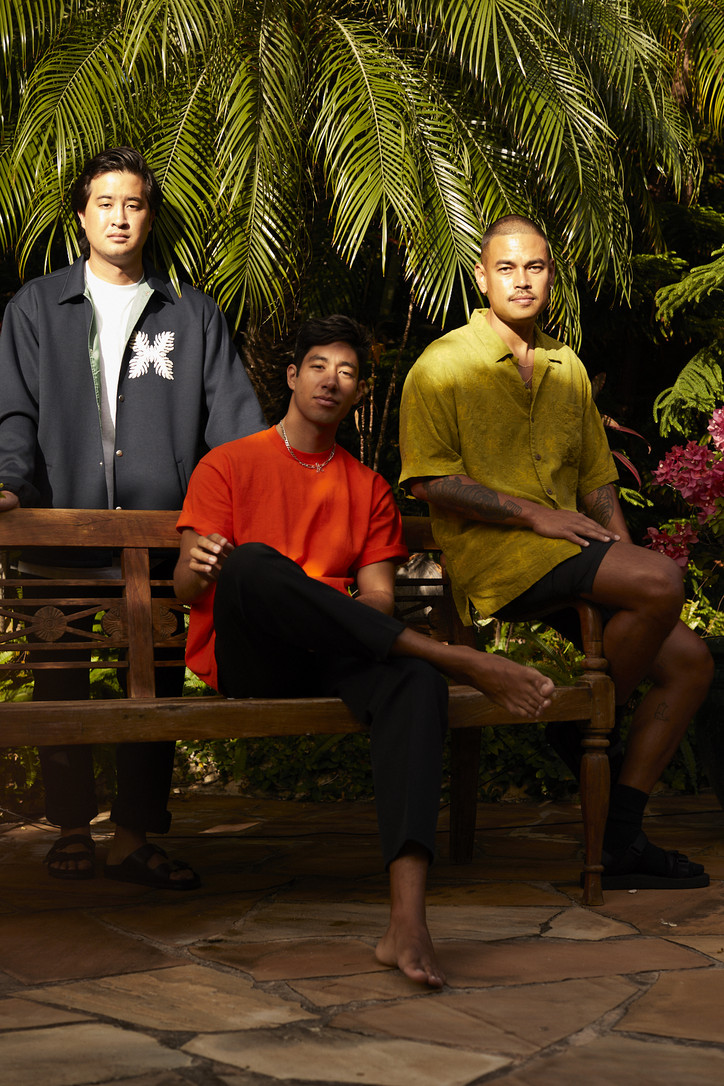
Koa is a company built for everyone under the sun and is deeply rooted in the Hawaiian islands.
Check out our interview with the founders below.
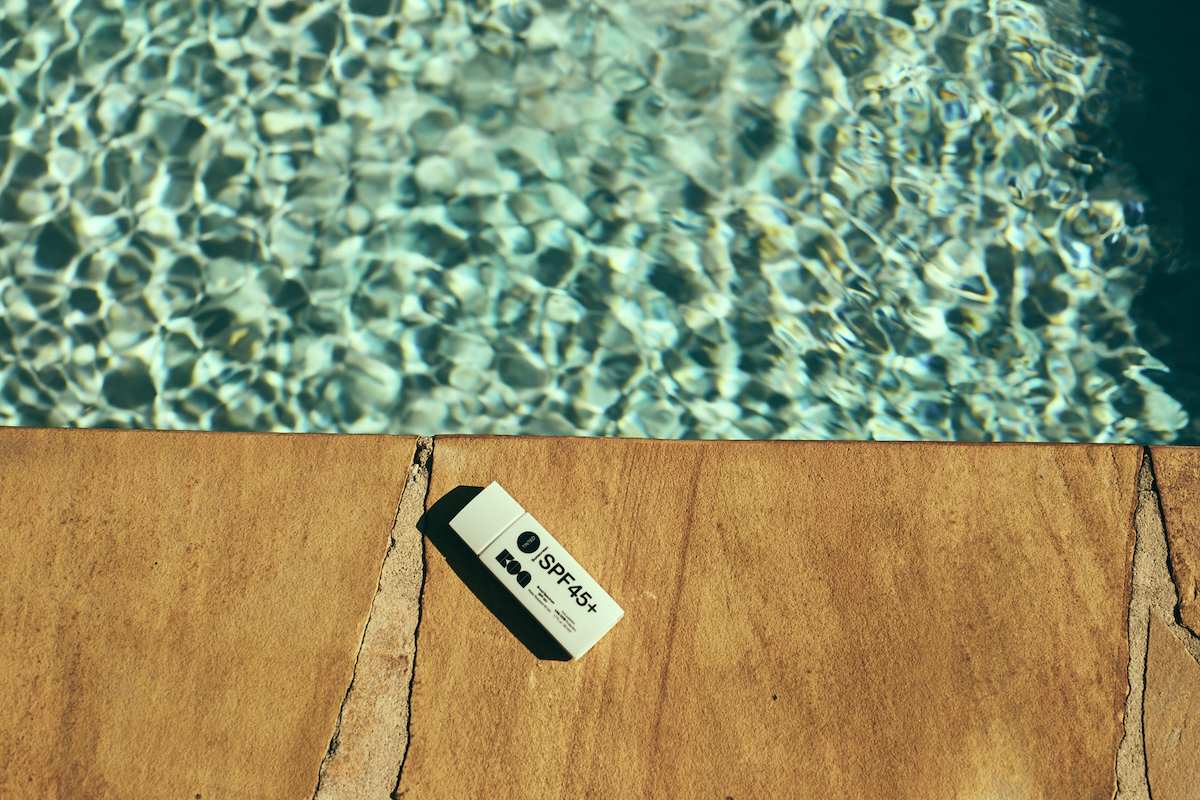
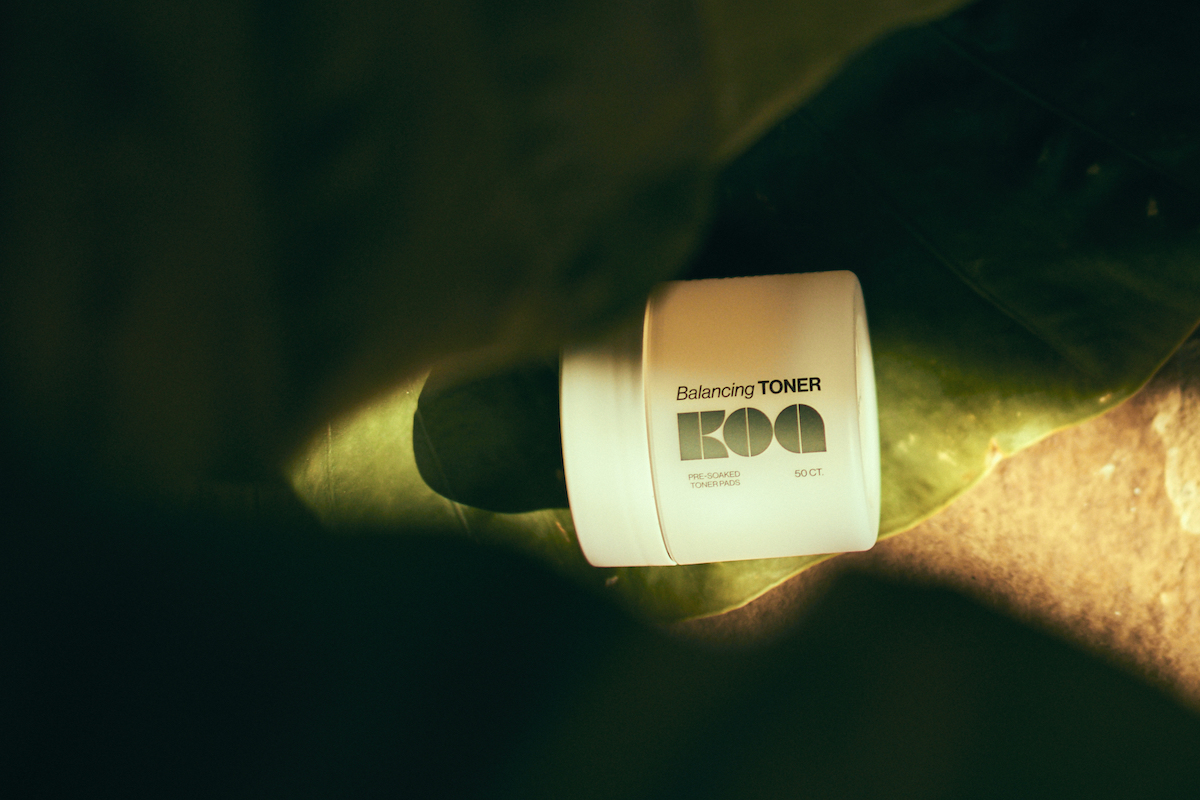
All three of you grew up or are from Hawai'i, a place where the sun washes over every corner of the island during all hours of the day. How did your upbringing in the islands Inspire your current ventures into the world of skin care?
Growing up and spending time in Hawai'i gives you the opportunity to connect with nature in a way that’s rare in other places. Everytime you go outside (and even when you’re inside), you’re reminded of the natural world around you. It’s easy to forget about what’s happening to your skin because of all the time spent outside.
With all of the sun and exposure to the elements, sunscreen is critical for keeping your skin healthy and preventing skin cancer and premature aging (a major cause of which is UV exposure). As people from Hawai'i, our lifelong relationship with sunscreen (we’ve tried everything out there!) helped us develop a formula that meets our high performance standards while feeling great on skin.
Hawai'i also has 10 of the 14 recognized climate zones, so your skincare has to be flexible enough to work in a wide range of conditions. That variability was a major driver of our product strategy, as our products are flexible enough to work across environments and climates. Whether you’re surfing or subway surfing, Koa keeps your skin healthy and happy.
With our products we also wanted to capture the feeling of being in Hawai'i. We often say we feel our healthiest when we’re in Hawai'i, not just our bodies, but our skin too. We wanted to share that feeling with customers so when they use our products they get the feeling of being in Hawai'i. We use Hawaiian botanicals like Kukui Nut, Giant Pacific Seaweed and [Hibiscus] which not only smell like the islands, but also give you that fresh, sun-kissed sensation of visiting (our) home.
Walk me through the creation of Koa, how did you all meet and when did you decide to build this brand?
Hiro and Ty met while working together in New York City. They always wanted to try their hand at something entrepreneurial and first had the idea for starting a skincare brand in late 2017. They both wanted to share the skincare knowledge they had from growing up in Hawai'i with a broader audience.
They met Kapono at his design studio in early 2019 and connected over their mutual roots in Hawai'i, that’s really when Koa was born. Koa launched in the summer of 2019 and we’ve continued to build the brand everyday since.
In addition to building great products inspired by our upbringing, we hope that our brand can serve as a platform for people to learn more about Hawai'i, why it means so much to us and how it can add to global conversations about things like sustainability and multiculturalism.
How do you implement pre-modern Hawaiian philosophies into your products and what does that look like for someone who didn’t grow up in Hawai'i?
Hawai'i and its local culture is a driver of the brand in many ways, but one thing we really wanted to incorporate was the heritage botanical ingredients found in Hawai'i and Asia (we all share Asian ethnicities). Many of the botanical ingredients we use currently and are planning to use in future products, have been used by their native cultures for centuries for their health benefits and we wanted to preserve that heritage while also incorporating modern ingredients to boost their efficacy.
Another core part of the brand is our emphasis on being connected with nature and doing less harm to the environment. That has been a key philosophy of Hawaiian culture since its beginning. The ancient Hawaiians understood that we are really stewards of nature and guests on the land, so it’s our responsibility to take care of it, as it takes care of us. In modern Hawai'i, people have a deep sense of sustainability that comes from living on an island and a respect for nature that we try to emulate as a brand.
What are you each responsible for behind the scenes and how do you split the work amongst yourselves and your team?
There is quite a bit of overlap when it comes to responsibilities of our roles, being a small team, many of the workflows and decisions we have to make involve all of us. At a high level, Kapono handles all of the creative and brand design decisions (ranging from packaging and web design, to social media posts and ads). Hiro handles a lot of partner workflows and strategic decisions, as well as being the lead on our website and marketing strategy. Ty works on strategic decisions, as well as managing relationships with retail partners, customers, and handling most aspects of the supply chain (working with our suppliers and logistics team). We all work on product development and major brand decisions.
What are the core ingredients in your products and how versatile are they in other climates?
Some of the key botanical ingredients in our products are things like Yuzu, Kukui Nut, Giant Seaweed, and Green Tea. We chose our botanical ingredients for their heritage and health benefits, and we paired them with modern ingredients to make sure they perform regardless of the climate.
For example, our cleanser removes oils and buildup without stripping skin of natural moisture, something that can be an issue in arid climates. Our moisturizer is a light-weight formula that isn’t too greasy in humid regions, but also works in drier environments due to the hyaluronic acid we include to help skin retain moisture.
Our SPF is an all around great pick for the zinc oxide protection it gives (which is much better for humans and the coral) and its high SPF and UVA protection ratings. It’s really designed to be a mineral SPF that you can wear comfortably everyday, without really feeling like you’re wearing SPF.
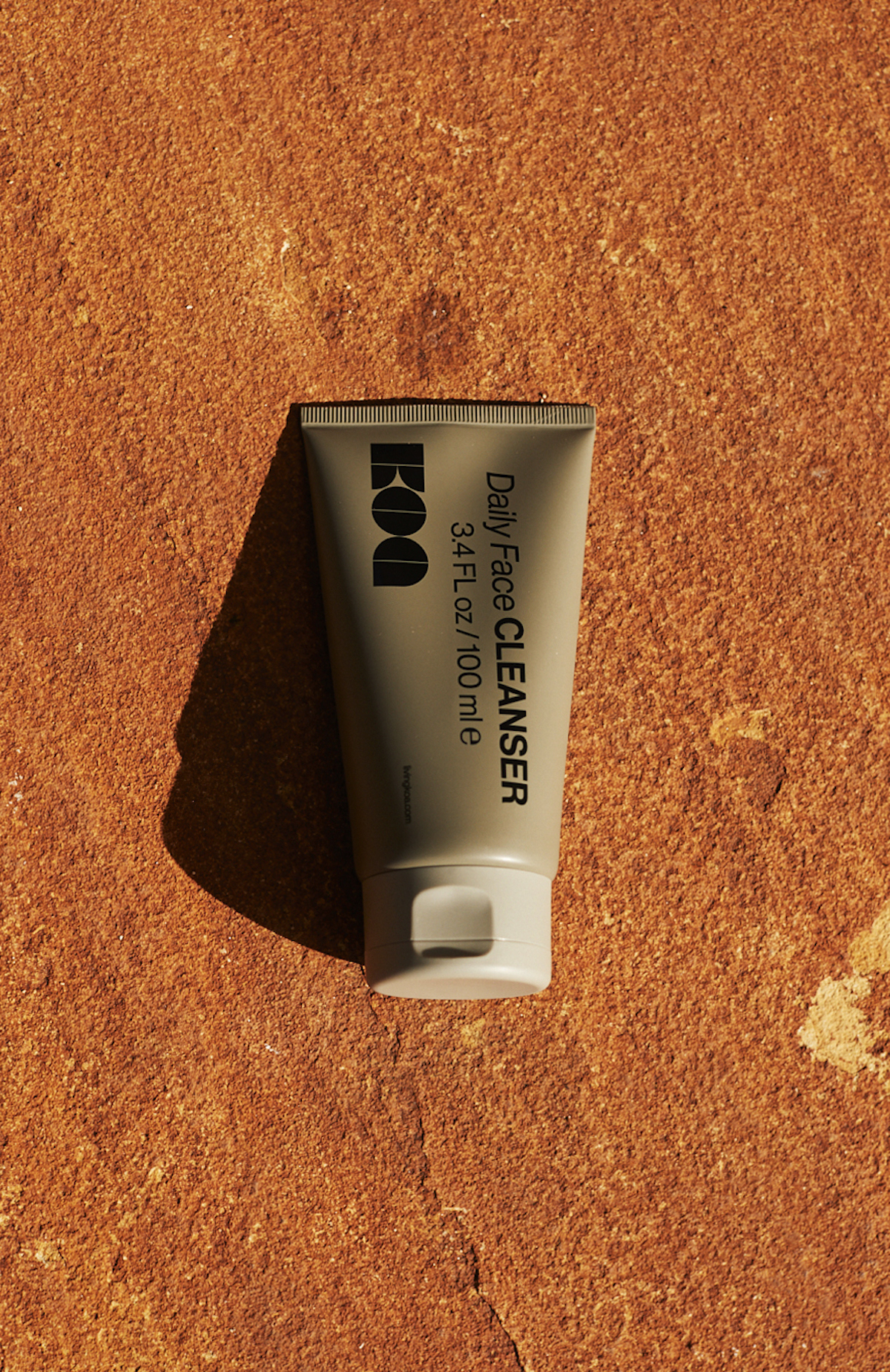
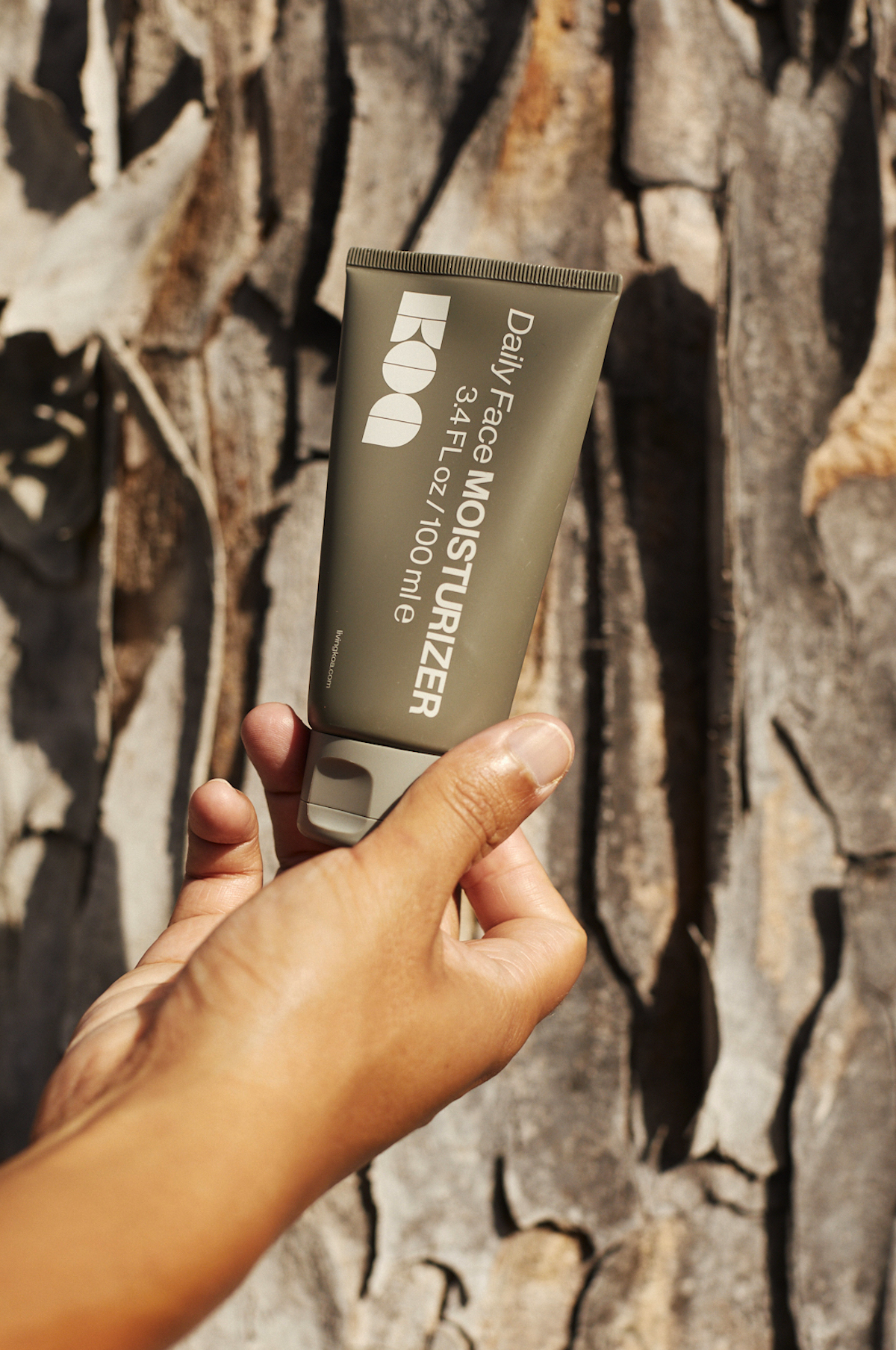
The preconceived notion with skincare for men is often looked at as something that “emasculates” them. How did you all shatter this perception with your personal values and line of products?
We think of ourselves as a non gendered skincare brand, because everyone has skin and we believe it’s important for everyone to think of skincare as an essential part of daily health (like brushing your teeth). Men are definitely a little more hesitant to jump into skincare until it becomes an issue (i.e., they start to notice the aging effects), but we’re really working on framing it as a preventative step to maintain your skin health. A lot of guys don't want to add more steps to their routine, but once they try it, they realize it really does make a difference in how their skin feels. It isn’t just about looking better, but feeling better too! Sustainability is very crucial in today's world and it seems like ‘Living Koa’ embodies the principles that surround this.
How have you enforced the importance of sustainability into your brand and what steps are you taking to improve?
Sustainability drives a lot of key decisions we make as a brand. From a brand building perspective, we spent a lot of time learning about supply chains and their impact on the plant. We made sure to seek out partners who share our views on sustainability and made an effort to minimize our carbon footprint as much as possible (and offset the rest with carbon credits). A few examples are using manufacturers with non-fossil fuel power sources, closed-loop water systems to prevent runoff and contamination, and using recycled paper or FSC-certified paper for all shipping packaging. We also use USPS for delivery as they have one of the lowest carbon footprints per package of all mail carriers and we are testing carbon-free local delivery methods in the near future!
That being said, we are far from perfect and are always trying to improve in terms of sustainability. Things we’re working on now include moving our packaging from virgin plastics to aluminum and post-consumer recycled plastics. We initially chose plastic because it’s lightweight (lowering its carbon footprint associated with transportation) and durable (fewer wasted components), but as we grow as a brand, we always want to explore better alternatives and improve how we do things.
I saw that the company itself donates 1% of every purchase to a non profit organization of the customers choice and that’s incredible. How do you curate the organizations that your customers get to choose from?
Previously we donated 1% of our proceeds to ocean preservation efforts, but felt like it would be great to open up the giving opportunities to more causes we care about. For our new giving program, we partnered with Beam to find and vet the organizations we donate to. We plan on growing this list as time goes on, but really wanted to give customers the opportunity to direct their donation to the causes they care about most.
The current giving options we offer customers to choose from are: Stop AAPI Hate, Alu Like (Native Hawaiian opportunity creation), The O’ahu Chapter of the Surfrider Foundation (ocean preservation), and Reclaim (LGBTQ+ mental health).
How do you all plan on expanding your brand in the nearby future?
We have a lot of things in mind for the future, including a product line expansion planned for later this year! One thing we always are mindful of when thinking about new products is making sure we aren’t putting them out for the sake of having new products. The cosmetics world is full of fad products, so we try to make sure we are making what our customers want and not just adding things to the world for the sake of it.
Another exciting thing we’re working on is a continuation of our ‘Living Pono’ (in Hawaiian pono means ‘good’ or ‘righteous’) collaboration program which we’ve been testing on a small scale. For the program, we partner with fashion brands to use their leftover fabric that might have otherwise gone to waste, and repurpose it into useful objects. Our first test of this program was a collaboration with Chromat to create hold-all bags from their leftover swimsuit fabric. We’re working on our next collaboration with two great Hawaii brands now, so keep an eye out for it soon!
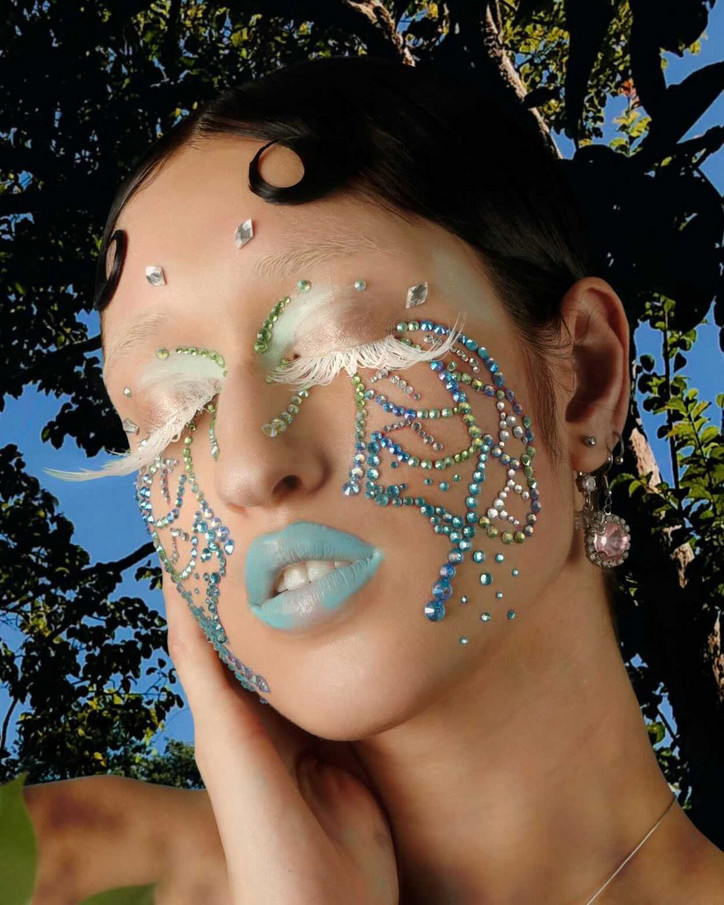
So, over the years, your looks with the gel hair and the face gems have become a staple. Where did those ideas come from?
I wanted to try something new. And then the swirls kind of just happened. When I was hanging out with a friend because they used to gel their hair a lot. I was like 'oh, I kind of want to try that.' But then I started to do other things and it kind of was, I was trying to figure out, I guess, how to feel comfortable, like still feeling my feminine energy, even though I had short hair, and I feel like the swirls kind of gave that little feminine touch. I am non-binary, but, I do feel like I identify more with more feminine energy. So I feel like I still wanted to have that even though short hair can be perceived as masc. So I feel like that's kind of like how it originated more, just like trying to figure out how to still feel feminine with shorter hair. Since it's perceived differently from long hair. It's like feminine, even though that's very backward thinking, you know?
I get you. You’re practically like Betty Boop.
Yeah!
How did you establish yourself differently from other artists and designers?
I've been in situations where I’ve been compared or a lot of people ask where my inspiration comes from, and I feel like it's a very generic answer, and it comes from everything that I consume. It's more like everyday life or just like a specific thought or a feeling. And I feel like, with my rhinestone looks, my initial thing is always to capture. A lot of people think that it started from Euphoria or something like that. And like in all honesty, it didn't. Like the way that it did was, so like, I was a fashion design major, in college and I graduated and I had like a fashion show and everything with school and I did use rhinestone trim and stuff like that. So, I had like leftover rhinestone trim and I was bored one day. And I had a fascination with editorial makeup, but I was always just like, “oh, like how do you even get into that? Like what, what is that?” You know? So I was just like one day I had like these little hair clips in my hair that kind of were like the same rhinestone as like what I had. And I was like, “What if I made that little flower clip on my eye?” And it was really weird. Since I tried gluing it, it was very uncomfortable. That was like when I didn't know what the hell I was doing, so it was kind of just like a wing moment. And then I didn't do anything again after that. A couple of months later it was Virgo season and I had the same trim and I wanted to just do the Virgo sign. And I think that's the look that started it — I was just like, this is fun. And I just felt in a way I was kind of creating my own world.
Your looks are so thorough and so interesting, are there any forms of media that inspire your work?
It's honestly everything and anything. My friends do inspire me. As well as everything I surround myself with. I do feel like I am inspired by fantasy stuff for the most part, especially because during quarantine, I played a lot of like ‘Zelda Breath of the Wild.’ So I got very intrigued in that realm and like fantasy with swords and stuff. My looks kind of feel protective, you know, warrior pieces where it's like my protection for myself in the world when I go out or just stuff like that. But yeah, I feel like it's everything, it's never really like a specific thing. It could be a thought or like a feeling or just something I like looking at.
So, you've been featured in office in the past and since that experience, what could you say has changed about you?
I feel like when I was interviewed last, I just came out as non-binary, and now it's like the year anniversary and I just feel like I've become more fluid with myself. And I feel like people can see that in my artistry because I feel like now I'm just really doing what I feel represents me most. I'm not trying to cater to what people expect me to be. And I feel like that was like what I was starting to realize early last year. But now, I just feel more confident in myself, and I feel more secure because I feel like I know who I am and I know where I'm going. And I'm just very grateful for that. Like, I was reading the article the other day and it's sort of like a full circle because a lot has happened in the past year. And I'm very grateful for the change that I've been able to have in myself and just like what I've been surrounding myself with too.
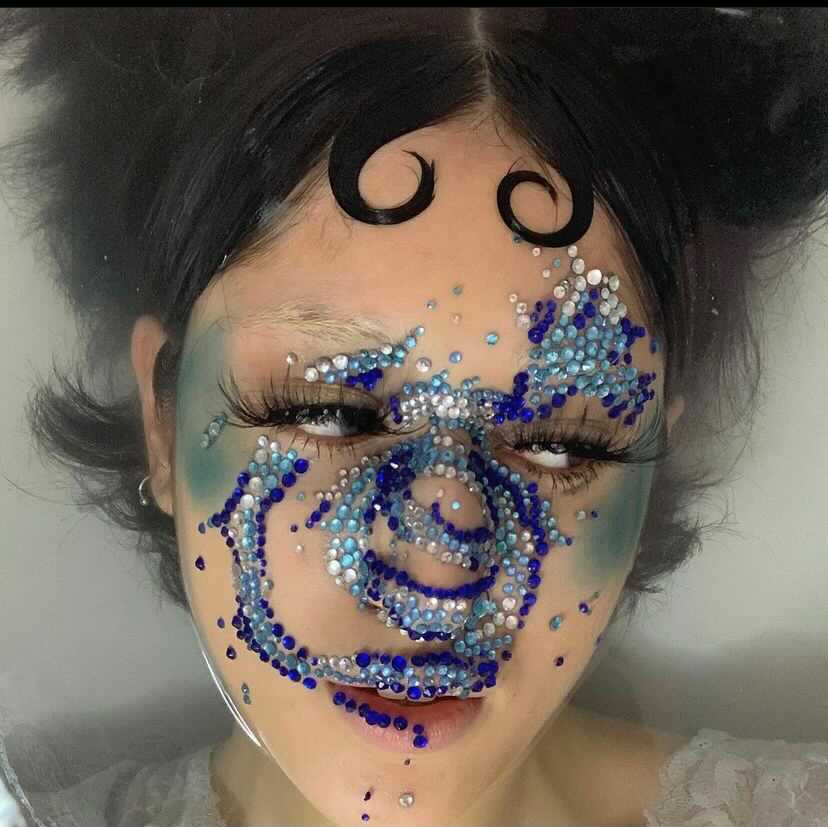
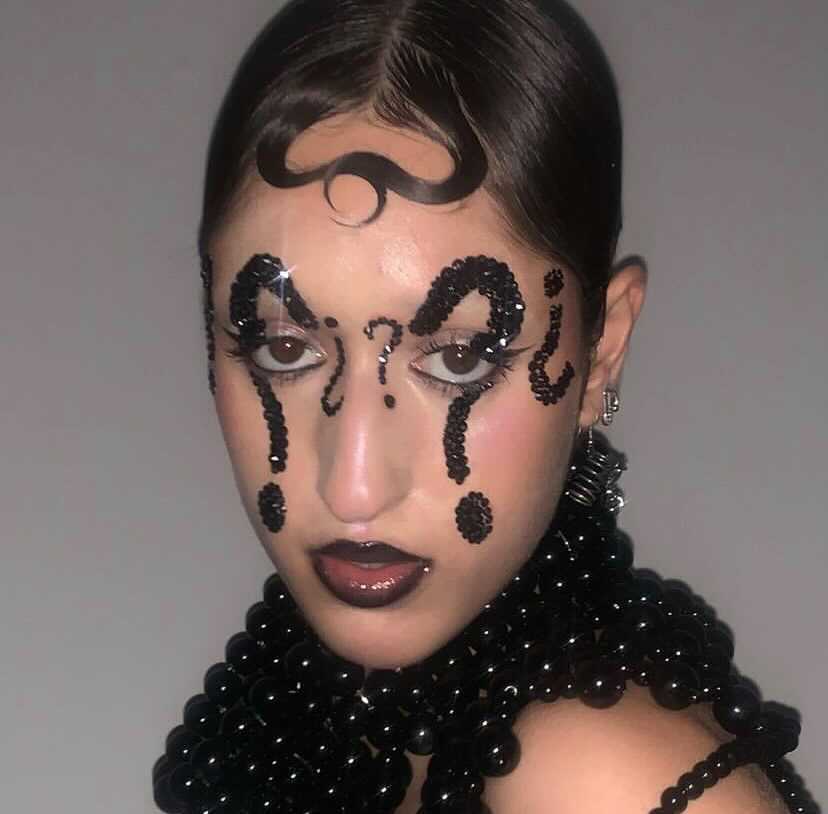
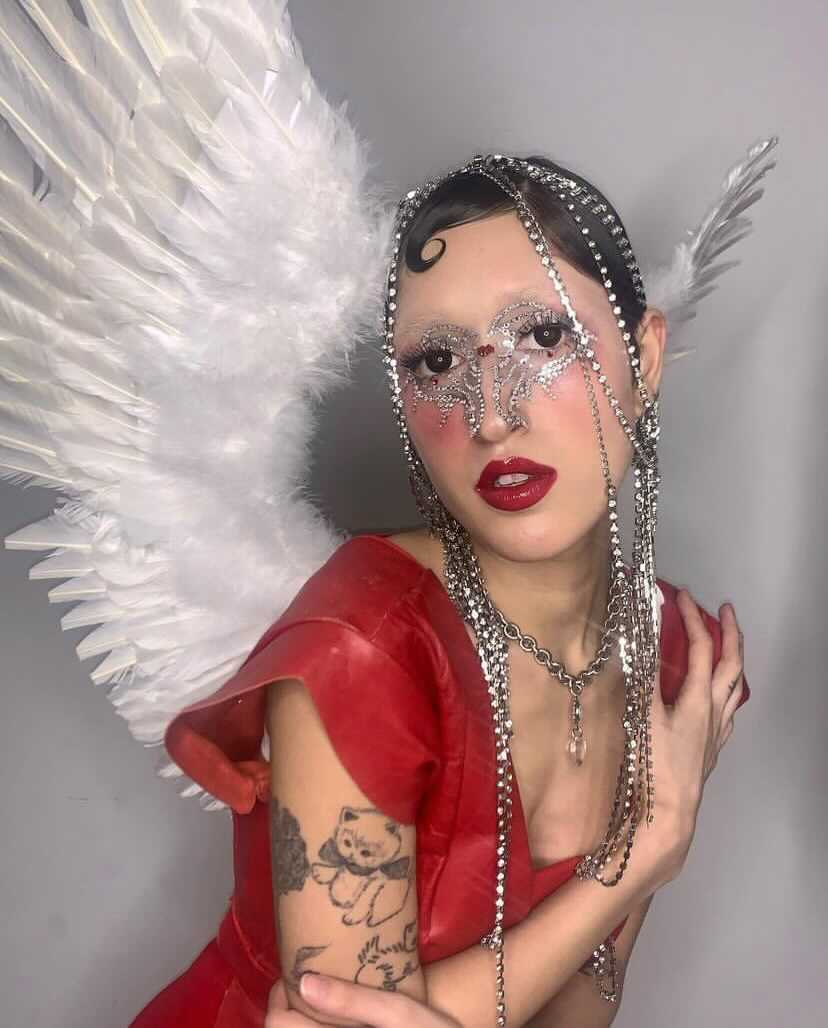
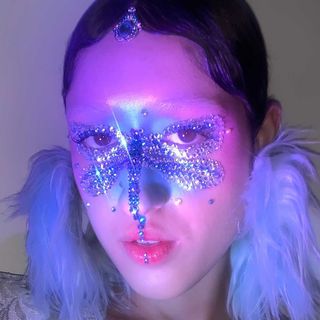
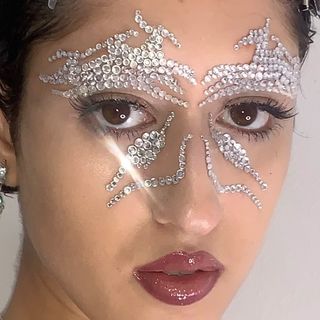
That's sweet. Okay. So since you're a designer, rhinestone artist, and model, how does your self- expression vary in all these different meetings?
Some days, I prefer to do one over the other or sometimes I'd like to mesh it into both and I feel like now I'm starting to realize that I want to incorporate these looks more within like modeling and having like a whole production or like doing them on other people for productions. Like honestly, one of my biggest dreams is to be booked by, you know, a huge artist, or a magazine spread, or music video. That would be like a dream honestly because I noticed that I enjoy doing it more on other people. I like being able to see my work and just seeing it on someone else instead of on myself, it's such a like different refreshing feeling.
One of my favorite looks from you is the question mark look you did. What specifically goes into these details and looks?
Really? I was kind of just like, I don't know what I want to do. I'm like ‘I want to do a look, but nothing comes to mind.’ I just felt like I was a question mark. So, then I said, “question mark.” Sometimes the looks are so simple in that sense where it's like a literal thought or like some are just like big concepts. Like, I did a four elements series that I would love to redo one day just because, I feel I can do a lot better now. But it was, I think, my biggest series and my favorite one is the water one just because I feel that it showcased, not just my patience level, but more of the artistry to it.
Can we expect any colors or themes that are going to come to mind in future projects?
For my rhinestone series, with the illusions, it focused a lot on black and whites, then the last clip is like a powerful red look just because that's kind of what the project is like. It kind of represents just very like in the dark and very lost in your thoughts. When I think of black and white, I feel like the loss of color, just various stagnant feelings. Then the red is kind of in your face. That's like the color play I wanted to make evident. I don't know what colors I'll be playing with next, but I do have some stuff, cause I am going to LA very soon. I feel like I'm going to be playing with some like orange and pink just because of the sunsets over there.
What are you trying to say with your work?
I want when people see my stuff to just feel something. No matter what it is, if you can feel a genuine feeling for my work, then I feel like I know that I did something really good. I don't want it to just be pretty, I want that when you look at it, you question, “where does that come from?” Like, “what inspired this? Oh, I feel this way. I wonder if that's how Kitty made it, how Kitty felt doing that.” And I feel like that's definitely what I want as an artist too.